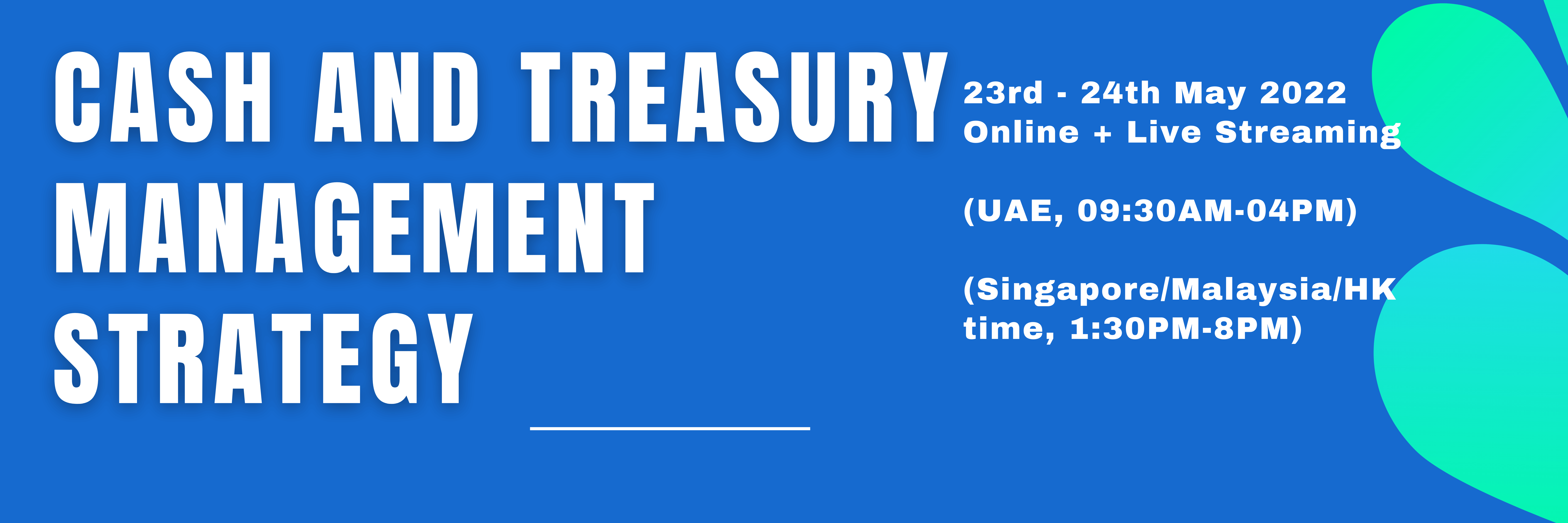Cash and Treasury Management Strategy
23rd – 24th May 2024
Online + Live Streaming
Course overview
The treasury strategy
This course covers the crucial areas of liquidity management and addresses the context of the treasury, the choices of centralization or not. Hedging is an interwoven subject helping organizations to actively manage the exposures that are being reported through the use of fully integrated ERP systems.
The different concepts are explained and also the Risk Management benefits with techniques will provide multiple benefits for the attendees. Learn to think “Global” rather than “Local” and see the developments of international cash liquidity management at its best.
No training can be effective enough unless there are illustrations and assignments supporting it. We have designed illustrations and assignments to strengthen the presented subjects.
Course Objectives
This program is designed to empower managers and leaders to oversee remote workers by taking a structured approach to leadership, decision making, and productivity.
This session will help you:
The objectives of the seminar are to enable delegates to:
- Gain knowledge of a great diverse subject area
- Practice and practical are interwoven and very important to illustrate
- The many assignments based on the real world will help to prove your understanding of the subjects.
- Practice will help you build confidence and provide a deeper understanding.
- Learn about the exposures and how to manage them effectively.
- Understand how important liquidity is for organizations.
- Gain a thorough understanding of cash management.
- Learn to avoid mistakes that can be very costly
- Learn what investing and trading is all about
- Learn how to make the better-informed decisions
- Managing liquidity and exposures means making decisions on a daily basis, and you need to be aware of how to make them.
- Become ready for the next step in your professional life.
- See the veil lifted on mysteries that revolve around
About Course Facilitator:
OUR COURSE LEADER worked, 40 years for international banks and institutions, covering international money-, foreign exchange-, and capital markets; as trader, senior trader, Chief dealer, Group Treasurer, and a Senior Consultant, and resided during his career in the following countries; The Netherlands, Singapore, Australia, USA, Saudi Arabia, Germany, Luxembourg, and Qatar, and settled permanently in The Philippines.
He managed large portfolios, and has set-up and managed large treasury functions. Working as a senior consultant, he was involved, hands-on implementations of treasury- and risk management systems, setting up the administrative functions, and the guiding policy documentations for those institutions he worked for. The system selection processes and requirements gathering, provided a deeper understanding of what really matters, and started to form a strong passion for this subject.
Peter’s love and passion for the treasury and related subjects made him write articles and blogs appearing The Gulf Times, Sydney Morning Herald, Reuters (USA), LinkedIn, Facebook. Examples of written work are focused on “Islamic Banking and Islamic Treasury”, “Funds Transfer pricing” and “IT implementations”.
Why should you attend this training?
f you wish to get solid understanding of these subjects, you will not like to miss out on this great opportunity. It is rare to get a knowledgeable view of 40-years of experience. You get the same insight that Peter has on the subjects, and you will understand to manage money, cash flows and making solid decisions. Even if you are not in the world of treasury or investments, you will gain information that others do not have. You will prepare yourself for the future, which is dynamic and ever-changing. It will help you grow and prepare you for further developments in your professional development. You must have an edge and stand out, which will be the end result of attending this training course.

